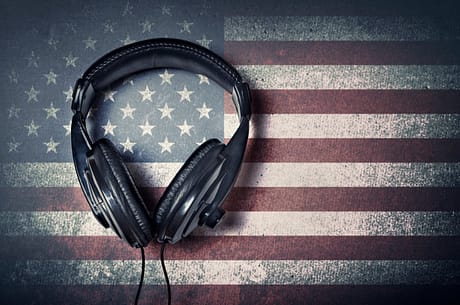
SBO+: Well-known author and frequent SBO+ contributor Harvey Rachlin provides this article on the important role music plays in developing and sustaining our national identity. In conversations with Harvey about this article, I suggested the traditional “American musical canon” needs to be expanded to include songs relevant to the diverse nation we have become, to which he enthusiastically agreed. The music students learn, especially in their early years, can enlighten, enrich, and educate them about all parts of America’s heritage and hope for the future.
One day, during a class I give on the history of popular music, I was taken by surprise. I was lecturing on late 19th century music, and when I mentioned the famous composer and band leader John Philip Sousa, I looked at the students spread across several rows in the crowded classroom and saw a sea of blank faces. “John Philip Sousa?” I repeated, this time as an exclamatory question. “The March King? You know him, don’t you? The students sat quietly until one said shyly “The name sounds familiar.” “Well, okay,” I responded, confident they really did know who he was. “Even if you don’t know his name you surely know his work.”
I walked over to the keyboard to my left at the front of the room, clicked on YouTube, and typed in a composition title. “Don’t you know his most famous composition, ‘The Stars and Stripes Forever’? You hear it every July 4th.” From the speakers Sousa’s iconic patriotic march blared and I thought the students would fall all over themselves with recognition. Some faintly smiled and indeed, said they had heard the tune before, but to my disbelief many claimed the tune was unknown to them.
The students’ unfamiliarity with music of the past wasn’t an entire surprise. As an educator I have found many students do not have a basic knowledge of the American music canon—songs like “America (My Country ‘Tis of Thee),” “The Battle Hymn of the Republic,” “When Johnny Comes Marching Home Again,” and “Anchors Aweigh.” I have taught at the college level for many years and have noticed students coming in who not only do not know these songs that were an integral part of the culture that helped shape our country but don’t even care to. They indubitably love music and can tell you all about the latest hit makers who they avidly follow on social media like Taylor Swift, Drake, Beyoncé and Post Malone, not to mention they can also effortlessly recite their lyrics, but the music that is inextricably tied to the heritage of our country is like a musty relic from a bygone age that holds no appeal to them.
Young people have historically been introduced to patriotism through inspiring stories about war heroes and events, indelible symbols such as the American flag and monuments, and stirring songs about our nation’s past. Today, however, patriotism is looked down upon by some people. In another recent class I played an original tune to get the students’ feedback. The song had lyrics that could be construed as patriotic, and one student responded “We don’t go for that. We’re not patriotic like your generation is.”
Understandably, from a student’s point of view, our nation today is embroiled in turmoil, torn apart by myriad social issues such as abortion, LGBTQ+ rights, immigration, discrimination, and global warming to name a few. America’s heritage is from a distant past and is enshrouded with its own bevy of social injustices. Why should we celebrate our nation’s past, they ask, when we rebuke its social practices?
Yet the America we have today resulted from people championing freedom and shedding rivers of blood to sever the manacles of human bondage as well as to uphold liberty in lands far from our own shores. Through all these struggles citizens were sundered by their own different political and social views, just as we are today. The issues may change, but the charged emotional differences remain.
Music is a glue that brings people together and we can all appreciate it in ways we find personally meaningful. During the Financial Panic of 1893, which resulted in an economic depression, Katherine Lee Bates, an English literature professor at Wellesley College in Massachusetts, travelled across the country to teach in Colorado Springs, Colorado. While there, she and other educators took a trip in prairie wagons to the top of Pikes Peak.
The rarified air made breathing difficult, so the trip had to be cut short but in her short time looking down upon the land Bates was so inspired by the grandeur of the view that she wrote about “amber waves of grain” and “purple mountain majesties above the fruited plain.” Bates, who some modern scholars allege to have been bisexual or lesbian, chose not to interpolate any political statements in her lyric but only to focus on “America the Beautiful.”
Indeed, we can proudly sing the songs of our nation’s past, celebrating America for its splendor and grace and for giving us the freedom to speak out today as we may, and still work to make our land the glorious nation we want it to be.
Courtesy New York Daily News








